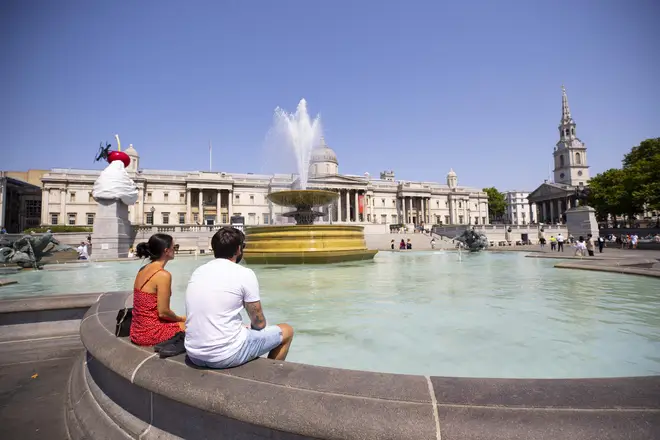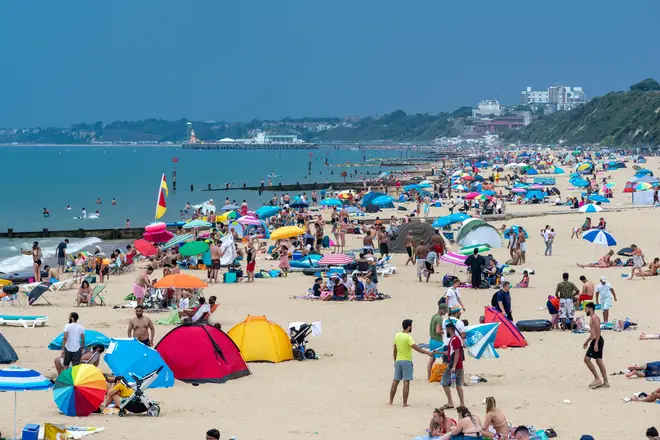
Matthew Wright 7am - 10am
27 July 2023, 15:07

July is "virtually certain" to be the world's warmest month on record, UN scientists said today - as they ushered in the era of ‘global boiling’ and called for urgent action on climate change.
UN Secretary General Antonio Guterres said “global boiling” was affecting the planet and he called for new targets from G20 countries to tackle the problem, urging the world to end the use of coal for power generation by 2030, or 2040 for non-OECD countries.
Mr Guterres said: “Climate change is here. It is terrifying. And it is just the beginning."
UN scientists said July 2023 is “virtually certain” to be the hottest month ever recorded on the planet - with some experts believing this month is the hottest in the last 120,000 years - with most agreeing that the rise in temperatures is due to the use of fossil fuels.
July 6 this year was the hottest day ever recorded for the planet - and the average temperature for the month so far is 16.95C - well above the 16.63 figure for July 2019.
Earlier today the Met Office issued a similar omen for the climate, saying the UK heatwave of 2022 will be considered mild by the year 2100 if carbon emissions continue at the same rate.
Last year was the hottest in the UK since 1884, when Met Office records began. It was also the hottest on the Central England Temperature record that stretches back to 1659.
This year has seen wildfires in several European countries amid scorching heatwaves, with temperatures over 47C - although the UK has endured a notably wet July so far.
The Met Office said that the 2022 milestones show how temperatures will continue to rise over the coming decades.
The Earth will continue to get hotter as long as people continue to emit greenhouse gases unchecked, forecasters said.
Mike Kendon, climate scientist at the Met Office and lead author of its new report, called State Of The UK Climate 2022, described the 40C mark as "a real moment of climate history".

He said: "This was a rare event in the context of the current climate but our extremes of temperature are changing faster than our mean temperature and we know that climate change increases the frequency, duration and spatial extent of heat waves."
On our current emissions trajectory, 2022 would be considered a cool year by the standards of 2100, Mr Kendon added.
Professor Liz Bentley, chief executive of the Royal Meteorological Society, said: "If you look at future climate projections, we are on a path to go for hotter, drier summers.
"So 2022 for me was very much a sign of things to come in future years with our changing climate."

The Met Office report, which tracks the progress of the UK's changing climate each year, noted that temperatures are rising above 36C more frequently than in the past.
Between 1961-1990 the highest temperature recorded was 31.3C; between 1991-2020 it was 33.5; between 2013-2022 it was 35.7C and in 2022 it was 40.3C.
Data from a citizen science project called Nature's Calendar was also included to track how plants and animals are responding to the changing seasons.
Fritha West, a research scientist with the Woodland Trust and one of the report's authors, said 2022 had a mild February and a warm October which meant an early spring and a late autumn.

Leaves were on the trees for 16 days longer than the 1999-2021 average and some flowers and insects emerged days earlier than usual.
Last year was also a relatively dry year, though not as extreme as 1976, and while summers are getting hotter and drier, the year-long climate trends show the UK is getting wetter generally.
Five of the 10 wettest years in the UK since 1836 have occurred in the 21st century and the UK saw its wettest February, April, June, November and December on record in the years after 2009.
Sea levels are also continuing to rise due to the melting ice sheets in the polar regions with long term trends showing the rate has doubled in recent years compared to the 20th century, said report author Dr Svetlana Jevrejeva of the National Oceanography Centre.

The Conservatives and Labour have both talked about watering down their environmental policies after the narrow victory of the Conservatives in the Uxbridge and South Ruislip by-election, which many put down to opposition to the Ultra Low Emission Zone expansion plans.
Dr Jevrejeva said in response: "It is important which path we choose and which scenario we follow, but sea level will rise for the next few hundred years in any case.
"It just depends on what kind of rate of sea level rise we will see, because heat is already in the ocean and ice sheets have already started to lose ice mass and the glaciers are disappearing.
"To get to equilibrium point it will take a few hundred years. We try to communicate our science and to make clear our understanding of what could happen. That's our role and that's what we do."